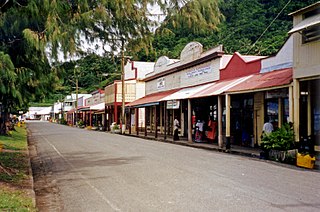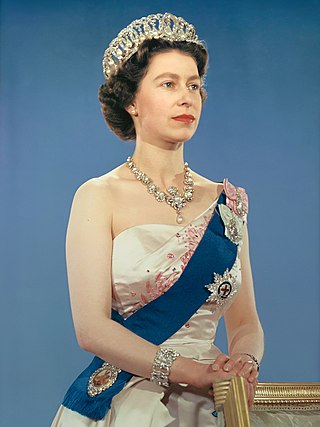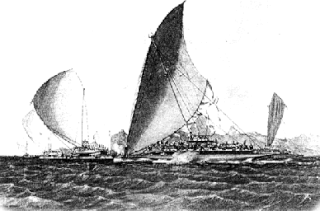
RatuSeru Epenisa Cakobau was a Fijian chief, monarch, and warlord (Vunivalu) who united part of Fiji's warring tribes under his leadership, establishing a united Fijian kingdom. He was born on Natauloa, Nairai Island in Lomaiviti but spent his youth on Vanuaso, Gau, Lomaiviti, later returning to Bau to re-establish his Father's Ratu Tanoa Visawaqa reign. Ratu Epenisa Seru Visawaqa was given the name "Cakobau" meaning destroyer of Bau, in reference to his grandfathers' (Nailatikau) effort to first claim the tile from the people of Butoni and Lovoni, returned with most of his warriors from Vanuaso, Gau, Lomaiviti to coup the leadership in Bau then and later takeover his father's title; known after his father as the 6th "Vunivalu" or Warlord of Bau.
Ratu is an Austronesian title used by male Fijians of chiefly rank. An equivalent title, adi, is used by females of chiefly rank. In the Malay language, the title ratu is also the traditional honorific title to refer to the ruling king or queen in Javanese culture. Thus in Java, a royal palace is called "keraton", constructed from the circumfix ke- -an and Ratu, to describe the residence of the ratu.
Nukulau Island is a small islet belonging to Fiji. It is close to Suva, Fiji's capital, which lies about ten kilometers to the west. It is an island rich in history, which has played a pivotal role in Fiji's demographic and political development over the past 160 years.
The House of Chiefs in Fiji consists of the Fijian nobility, composed of about seventy chiefs of various ranks, majority of which are related. It is not a formal political body and is not the same as the former Great Council of Chiefs, which was a political body with a prescribed constitutional role, although the membership of the two bodies did overlap to a great extent.

ʻEnele Maʻafuʻotuʻitonga, commonly known as Maʻafu, was a Pacific islander who held important titles in two countries in the Pacific. He was a traditional Tongan Prince and a Fijian chief nominated and installed by the Tovata chiefs of Lakeba and Vanua Balavu as 'Tui Lau' in 1869. This title was ratified by a wider council of Fijian chiefs and subsequently formalised under British colonial administration. In 1847, Maʻafu went to Fiji in an expedition to Vanua Balavu to investigate the killing of a preacher.

Levuka is a town on the eastern coast of the Fijian island of Ovalau, in Lomaiviti Province, in the Eastern Division of Fiji. Prior to 1877, it was the capital of Fiji. At the census in 2007, the last to date, Levuka town had a population of 1,131, about half of Ovalau's 8,360 inhabitants. It is the economic hub and the largest of 24 settlements on the island. Having been nominated decades prior, Levuka was designated a UNESCO World Heritage Site in June 2013, in recognition of the port town's exceptional testimony to the late colonial port towns in the Pacific.

Turaga na Vunivalu na Tui Kaba, shortened as Vunivalu, is the Paramount Chief of the Kubuna Confederacy of the island of Bau in Fiji. Loosely translated the title means Warlord of Bau or "Root of War". The succession to the title does not follow primogeniture, but the candidate must be a high-ranking member of the Tui Kaba clan.
The Tui Cakau is the Paramount Chief of Cakaudrove Province in Fiji.

The Lomaiviti archipelago of Fiji consists of seven main islands and a number of smaller ones. They cover a total area of 411 square kilometres (159 sq mi), and had a population of 15,657 at the most recent census in 2017. The largest town, with a population of 1,131 in 2007, is Levuka, which was Fiji's first modern town and served as the capital from 1871 to 1877.

Bau is a small island in Fiji, off the east coast of the main island of Viti Levu. Bau rose to prominence in the mid-1800s and became Fiji's dominant power; until its cession to Britain, it has maintained its influence in politics and leadership right through to modern Fiji. Due to its sacred nature, foreigners have to apply for a permit to visit.

The monarchy of Fiji arose in the 19th century, when native ruler Seru Epenisa Cakobau consolidated control of the Fijian Islands in 1871 and declared himself king, or paramount chief, of Fiji. Three years later, he voluntarily ceded sovereignty of the islands to Britain, making Fiji a crown colony within the British Empire.

Sir John Bates Thurston was a British colonial official who served Fiji in a variety of capacities, including Premier of the Kingdom of Viti and later as colonial Governor.

Namalata is a village and island in Fiji. It is located in the southern portion of the Vanua Balavu island group, part of Fiji's Lau Islands. The village is a constituent of the larger Lomaloma village.

RatuTanoa Visawaqa was a Fijian Chieftain who held the title 5th Vunivalu of Bau. With Adi Savusavu, one of his nine wives, he was the father of Ratu Seru Epenisa Cakobau, who succeeded in unifying Fiji with the help from British missionaries and the crown into forming the contemporary Fiji today.

The Lasakau Sea Warriors were a 19th-century warrior sub-culture in the pre-colonial state of Bau, in Fiji. The sea warriors were instrumental in spreading Bau's political power throughout the South Pacific archipelagic islands. The rise of the eminent islet of Bau amongst other embryonic states was due mainly to the projection of sea power through its naval forces. Bauan chief Ratu Loaloadravu Tubuanakoro was praised by French Captain Dumont D'Urville in May 1827 for his geographic knowledge of the Fijian archipelago signifying Bau's naval influence. More far-ranging than Bau's land warriors led by the Vusaradave clan, the Lasakau clan became the leading proponents of war and tribute for the emerging island kingdom. They became known as the Bai kei Bau or 'War fence of Bau'. Sahlins made the crucial observation that," The kings of Bau based their rule not on native cultivators but on native sailors and fishers-which is to say in Fijian categories, as in political strategies, not on the land but on the sea". This was the great political transformation that catapulted Bau to power over other pre-colonial kingdoms.
Bau is the main village on Bau Island, Fiji. Once integral to the power and economy of the chiefly village, the villages of Lasakau and Soso are also located on the twenty-two acre island which became the centre of traditional power throughout the Fiji Islands in the nineteenth century.

The first Fiji expedition by the United States was in October 1855 during the civil war on the islands. In response to the alleged arson attacks on the American commercial agent in Lautoka, Viti Levu, the navy sent a warship to demand compensation for the attack from Seru Epenisa Cakobau, the Vunivalu of Bau and self-proclaimed Tui Viti.

The Kingdom of Fiji, also known as the Kingdom of Viti, was a short-lived monarchy in Fiji. It existed from 1871 to 1874, with Ratu Seru Epenisa Cakobau as King.
George Austin Woods was a British navy officer who served as premier of the Kingdom of Viti between May 1872 and 1874.

The majority of Fiji's islands were formed through volcanic activity starting around 150 million years ago. Today, some geothermic activity still occurs on the islands of Vanua Levu and Taveuni. Fiji was settled first by the Lapita culture, around 1,500–1,000 years BC, followed by a large influx of people with predominantly Melanesian genetics about the time of the beginning of the Common Era. Europeans visited Fiji from the 17th century, and, after a brief period as an independent kingdom, the British established the Colony of Fiji in 1874. Fiji was a Crown colony until 1970, when it gained independence as the Dominion of Fiji. A republic was declared in 1987, following a series of coups d'état.

















